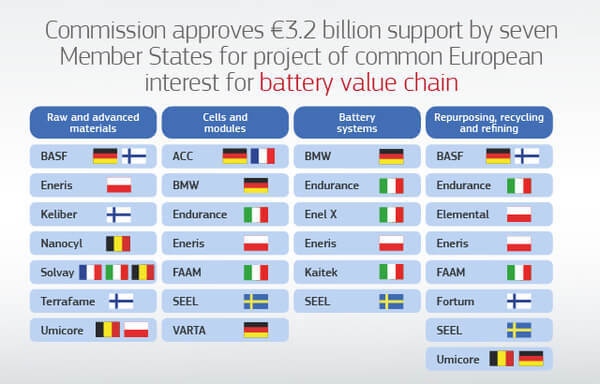News Release from windfair.net
Wind Industry Profile of
Major European Battery Research Project Launched
The transition to climate neutrality, including clean and low-emission mobility, will offer significant opportunities for economic growth, job creation and technological development. The demand for batteries is therefore expected to grow very rapidly in the coming years. The European Commission launched a European Battery Alliance with interested Member States and industry at the end of 2017 and adopted a strategic action plan for batteries in May 2018.
Within the project framework, sustainable technologies for lithium-ion batteries (liquid electrolyte and solid state) that last longer, have shorter charging times, are safer and more environmentally friendly than those currently available will be developed.
In addition, care will be taken to improve environmental performance in all segments of the battery value chain. The aim is to reduce the CO2 footprint and the waste generated in the various production processes and to develop environmentally friendly and sustainable dismantling, recycling and refinement in the sense of recycling management.
The seven participating states will provide up to EUR 3.2 billion for this project in the coming years, which is expected to release a further EUR 5 billion in private investment. Completion of the overall project is planned for 2031 (with different timetables for each sub-project).
Margrethe Vestager, Executive Vice-President 'Europe fit for the Digital Age' and Commissioner in charge of competition policy, said: "Battery production in Europe is of strategic interest for our economy and society because of its potential in terms of clean mobility and energy, job creation, sustainability and competitiveness. Our Important Projects of Common European Interest smooth the way for public authorities and industries from several Member States to come together and design ambitious innovation projects with positive spill-over effects across industrial sectors and regions. The approved aid will ensure that this important project can go ahead without unduly distorting competition.”
Maros Sefcovic, Vice-President for Interinstitutional Relations and Foresight, said: “Our focus on scaling up innovation under the European Battery Alliance is yielding strong industrial partnerships. Thanks to intensive efforts by seven Member States, industry and the Commission, Europe's first major pan-European battery ecosystem is emerging, with lead projects in all segments of this strategic value chain. We have found the right recipe for our 21st century industrial policy: strong cooperation between industrial actors, concerted action to accelerate lab-to-market innovation, joined-up financial instruments from both, private and public sectors, and a fit-for-future regulatory framework to underpin a stronger European knowledge-based economy.”

Overview of participants in the project (Graphic: European Commission)
The project will involve 17 direct participants, mostly industrial operators, including small and medium-sized enterprises, some of which will operate in more than one Member State. The direct participants will work closely together and with over 70 external partners.
Herbert Schein, CEO of VARTA AG, commented on the participation of his company: "We are pleased that we were able to convince with our concept. In the coming years, VARTA AG will continue to profit from the increasing demand for lithium-ion batteries of first-class quality and highest energy density. To this end, we will continue to develop lithium-ion technology with regard to these requirements, particularly with regard to its implementation in production."
German Car manufacturer BMW is also involved in the project and is already demonstrating today that great importance is attached to sustainability. For example, the company has concluded a supply contract with Ganfeng for sustainable lithium from mining in Australia. The focus is on ethically responsible raw material extraction and processing. Compliance with environmental standards and human rights has top priority. "Sustainability is an important aspect of our corporate strategy and plays a central role in the expansion of electric mobility. We are fully aware of our responsibility: lithium and other raw materials must be extracted and processed under ethically responsible conditions," stresses Dr. Andreas Wendt, Member of the Board of Management of BMW AG responsible for Purchasing and Supplier Network. The lithium near Ganfeng is extracted by mining from hard rock deposits in Australia. The highest standards of sustainability apply.
- Author:
- Windfair Staff
- Email:
- press@windfair.net
- Keywords:
- European Commission, battery, storage, Varta, BMW, project, sustainability, participation, raw materials
























